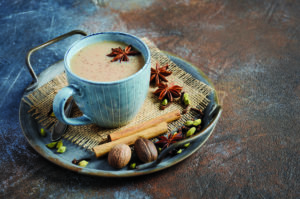
It is that time of year again — winter in the North, summer in the South — but holiday season, nonetheless. Many of the major religions/cultural traditions have important holidays this time of year — and the retail and marketing industry make it their goal to guilt us into spending more money than we want to “make the holidays bright”. Some of us, or our family members/friends are facing serious illness in themselves or loved ones; others are economically fragile, and guilt can set in if we cannot afford “the perfect holiday”. Some are alone, with no real social or family support — and “just getting through” the holidays is their goal. For some of us, it will be the first major holiday without a loved one, which adds a layer of emotion that can be difficult when one
is supposed to be having a “holly jolly” holiday season. It can be especially challenging for those needing hospitalization, home care, hospice care at this time of year, and for their loved ones.
The holistic nurse herbalist in me wants to tell everyone to slow down, take a breath, and think about what really brings you joy. From the herbal world, I would recommend a cup of adaptogenic tea to help calm the nervous system and support the seasonal stressors that can influence our immune systems and adaptive responses. There is a lot of research — and much more ongoing — in the field of medicinal mushrooms and immunity, and the stress response. Consider adding some reishi, shiitake, chaga, lion’s mane or cordyceps mushroom into your daily habits — even if you don’t like mushrooms, you can find mushroom powders and extracts that are produced using Good Manufacturing Processes that can be added to almost any drink, soup or food. Evidence shows they can pack a punch when it comes to supporting our immune system.
If you just cannot fathom the idea of incorporating mushrooms, then perhaps you have noticed that as it gets cold, your cravings for different flavors change? Mine certainly do as we have crisp evenings and the days are cooler and blustery. I start craving warming foods and beverages, soups become more of a part of my
daily routine, and I start to put aside my coffee and go straight for teas with herbs that I know will warm me up. During the day, you can add warming herbs and spices to foods, too — turmeric root can be sauteed with veggies and your protein source of choice, along with black pepper, garlic and cayenne. These herbs can also be sauteed into onion and celery which are basic ingredients in just about every soup. Thyme and oregano also go into soups/broths, as well as honeys for possible sore throats later on — these are solid antivirals that also have a warming quality.
I think we crave these herbs and spices for another reason than just their warming quality, too — they help support our immune systems as we come into the time period for respiratory illnesses. Additionally, many of these help to move our digestive systems along, which is important when you stop to realize that we often eat heavier foods in the winter and, for many of us, our physical activity may slow down too. Start experimenting with some warming herbs and spices. You might be pleasantly surprised by the taste explosion that many of our traditional “cookie spices” can bring to everyday foods.
Check out my Adaptogenic Chai Tea recipe! My recipe includes two Ayurevedic, adaptogenic herbs: ashwagandha (Withania somnifera) and shatavari (Asparagus racemosus), along with many traditional “cookie spices” that have warming and immune-supportive qualities. It should be noted that shatavari is actually a cooling herb, but in this case I use it for energy and immunity. Ashwagandha is moistening, which is good when using a lot of warming herbs (which can be drying), but it is known for its immune support properties. Perhaps the most important part of this recipe is focus. Use this time to really enjoy savoring the aromas of the spices, and to set your intention for the day ahead. And when it’s finally done, take the time to sit and enjoy the incredible combination of flavors — and warmth — this cup of chai provides.
Happy holidays — my wish for you is you can relax, find your joy, and remember the true meaning behind whatever holiday you celebrate this season!

Heather’s Adaptogenic
Chai Tea Recipe
Ingredients:
3 cinnamon sticks
1 TBS finely chopped,
fresh organic ginger root
6-8 cardamom pods,
crushed
6-8 whole cloves, crushed
6-8 whole black
peppercorns, crushed
1 tsp finely chopped turmeric
1 tsp ashwaghandha root, dried
1 tsp shatavari root, dried
½ tsp grated nutmeg
Loose Assam black tea to taste — I use 1-2 TBS (I like it strong!)
8 ounces coconut milk
Honey or maple syrup
Directions:
1. Add all spices (not the black tea) to a small saucepan and pour in 12 ounces of water. Bring to a boil, then lower heat and simmer for 20 minutes.
2. Remove from heat. Add your desired amount of black tea, cover the pan and steep 5 minutes.
3. Strain and compost tea and spices. Add sweetener to taste.

T. Heather Herdman, PhD, RN, FAAN is a nurse, clinical herbalist and aromatherapist, who believes that a combination of traditional (herbalist, for example) and allopathic (Western) health care practices provide the
strongest possibilities for health and well-being. She is the owner of Sweet Willow Wellness and Sweet Willow Herbal
Co-op (De Pere). She holds nursing masters and doctoral degrees from Boston College, and an undergraduate degree from University of South Carolina. She has authored numerous publications in peer reviewed journals, and her academic interests include clinical reasoning, spirituality, cultural health care practices, and integrative heath care. Heather provides clinical consults and custom blend herbal products for clients. Contact Sweet Willow Wellness at: 920-632-4696, www.SweetWillowWellness.com, Facebook: www.facebook.com/SweetWillowWellness, Instagram:
@sweetwillowwellness Address: 327 Main Ave., Ste B, West De Pere.




